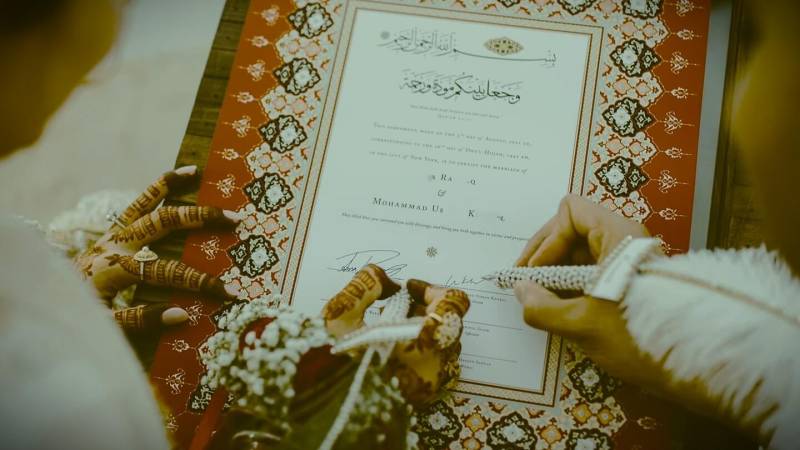
The erstwhile chairman of the Pakistan Tehreek-e-Insaf (PTI), Imran Khan, is a happening character — and has always been on and off the cricketing fields during his playing career and more so since entering the political arena. His recent triad with the law involved detailed public introspection of his wife's menstruation cycle, which defines the period of 'Iddah'.
This reminded me of another very happening man in the subcontinent, Muhammad Ali Jinnah. Interestingly, in his legal career, Jinnah also dealt with a case involving the period of 'Iddah'.
Four score and seven years ago, in 1935, when Jinnah was vacationing in Srinagar, he was approached by Sheikh Abdullah and Advocate Afzal Beg. Calling on Jinnah at his rest house, they requested him to take on an intricate case of their acquaintance, Mirza Mehr Ali (a police inspector), involving a nikkah over nikkah with Hanifa Begum. Sheikh Abdullah, in his autobiography 'Blazing Chinar' (Urdu version, pages 304-5), recounts that it took some effort to convince Jinnah to take the case, but no amount of pleading made him budge from the demand of a fee of Rs1,000 per court appearance. Sheikh sahib and his compatriots raised this money from donations.
The facts of the case briefly state that Hanifa Begum's first husband was killed by police firing in 1931. She subsequently married Abdul Kabir and then to her present husband, Mirza Mehr Ali. However, after three years, her former husband Kabir filed a complaint that Islam provides a waiting period of four months and ten lunar days for a widow in order to remarry, this being known as "Iddat", whereas her marriage to Ali had taken place during the period of Iddat and was therefore invalid. The trial court had acquitted Mirza Ali for want of knowledge but convicted Hanifa Begum.
The pith of Jinnah's argument was that the iddat period of four months and ten days under Islamic law was to be counted in lunar months only when the death of a husband takes place on the first of the "lunar month"; otherwise, it had to be counted as 130 days simple
Now to Afzal Beg (advocate of Hanifa Begum), it appeared from the facts that this was a lost case for Hanifa Begum, thus the request to hire Jinnah for lodging an appeal in the High Court. Hanifa Begum had been convicted under section 494 of the Ranbir Penal Code, which carried a maximum sentence of seven years and a fine. Sheikh Abdullah recounts that since the case was important, on the day of the court appearance, the courtroom was jam-packed.
Rather than defending the marriage of Mehr Ali, Jinnah assailed the marriage of Abdul Kabir and argued that according to Islamic injunctions, a widow could remarry only after observing Iddat, which is a period of four months and ten lunar days from the date of death of her husband. The question was whether Hanifa had remarried Abdul Kabir during the period of Iddat. If so, then that marriage was null and void under Islamic law, and since that marriage was void, her marriage with Mehr Ali was valid.
The pith of Jinnah's argument was that the iddat period of four months and ten days under Islamic law was to be counted in lunar months only when the death of a husband takes place on the first of the "lunar month"; otherwise, it had to be counted as 130 days simple, according to the solar calendar. If iddat, he argued, was counted as 130 days simple and applied, Hanifa's marriage with Abdul Kabir (complainant) fell during the Iddat period and thus was null and void while her marriage with Mehr Ali was valid as per Sharia. It is said that when the Chief Justice asked: "Mr Jinnah. Is there any authority?" He replied: "My Lord. I am the authority".
Jinnah won the case.
I wonder, given the current political scenario of the land of pure, if even Jinnah could have avoided flak from ardent PTI fans had he made the same iddat calculations today. Notwithstanding the legal debate upon the interpretation of section 496 of the Pakistan Penal Code (PPC) and the quantum of sentence awarded vis a vis the political angle of this whole trial, Imran has certainly brought to fore another legal question: Is marriage during iddah an irregular or a void marriage? More so because of the timing of the judgement and the manner in which the public eye has perceived that the trial was hurried; thus, a mere legal issue has turned into a political one.
This has barred the basic deed that, in fact, a nikkah was hurried, whereas it could have been delayed! We, the mortals, are minions to tell our leaders that their deeds must personify their words. Since the legal the question has ballooned into a debated legal controversy; the best we can hope is that the best legal minds in superior courts shall put forth a detailed judgement in appeal covering all the angles (both legal and religious) along with inconsistencies to reach a settled position.

